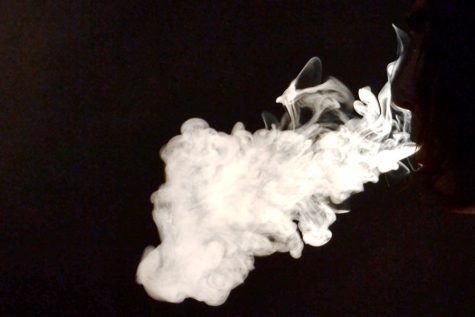Experts say vaping may be harmful
A white haze fills the air, forming rings and other shapes. It looks like smoke, but it’s actually vapor from e-cigarettes. Vaping is currently a popular trend among teens. They say it’s refreshing, it’s cool and it’s different.
But vaping may be more dangerous than you think.
E-cigarettes, battery powered cigarettes, do not contain tobacco. But the liquid vaporized while using an E-cigarette almost always contains nicotine, which is a highly addictive drug.
E-cigarettes come in three types: minis, vape pens and advanced personal vaporizers. Minis are disposable, while vape pens are rechargeable. Advanced personal vaporizers, sometimes called “mods,” are customizable vaporizers.
Some brands, such as Juul vaporizers, look like USB drives, and others, such as Suorins, are pods that resemble credit card cases. One pod usually contains the same amount of nicotine as one pack of cigarettes — which has around 200 puffs.
Health effects
Since vaping is a relatively new trend, not much conclusive or long-term research has been done. Industries claim that e-cigarettes help people quit traditional smoking, and reduces interaction with tar and other chemicals present in cigarettes. The New York Times reported teens who vape are also likely to switch to smoking conventional cigarettes intensively in the future, according to Mitch Zeller, head of the Food and Drug Administration’s tobacco division.
The vaporized liquid in e-cigarettes can be harmful, according to the U.S. Surgeon General. The fluid used in e-cigarettes, sometimes called “juice,” come in a variety of flavors, such as fruits or desserts. Though sold with different levels of nicotine, zero-percent nicotine e-cigarette liquid, or “juice,” is rare. The liquid also contains many toxic chemicals and flavorings, such as Propylene glycol, an alcohol used in antifreeze and can cause irritation and headaches.
Nicotine is one of the most addictive drugs that can relieve anxiety, a reason why people choose to smoke cigarettes, according to Dr. James Tao, Associate Professor of Neurology at the University of Chicago Hospital, but the nicotine can also cause breathing problems and lung diseases, as well as hampering brain development in teens.
Legality
Although they don’t contain tobacco, the FDA considers e-cigarettes to be a tobacco product because they contain nicotine. Under the FDA’s policy, they are also subject to the Family Smoking Prevention and Tobacco Control Act and state laws for tobacco products, so they cannot be sold to minors.
Vaping is banned on all campuses of state-supported institutions in Illinois, including vehicles and parking lots owned by those institutions. In Chicago, vaping is “banned in all enclosed workspaces, including bars and restaurants,” except in vape shops, according to the American Nonsmokers’ Rights Foundation. If caught smoking in a non-smoking location, perpetrators can incur a fine. The fine ranges from $100 to $250.














